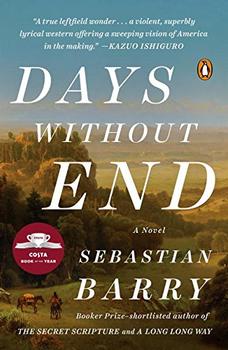Summary | Excerpt | Reviews | Beyond the Book | Readalikes | Genres & Themes | Author Bio

Chapter One
The method of laying out a corpse in Missouri sure took the proverbial cake. Like decking out our poor lost troopers for marriage rather than death. All their uniforms brushed down with lamp-oil into a state never seen when they were alive. Their faces clean shaved, as if the embalmer sure didn't like no whiskers showing. No one that knew him could have recognised Trooper Watchorn because those famous Dundrearies was gone. Anyway Death likes to make a stranger of your face. True enough their boxes weren't but cheap wood but that was not the point. You lift one of those boxes and the body makes a big sag in it. Wood cut so thin at the mill it was more a wafer than a plank. But dead boys don't mind things like that. The point was, we were glad to see them so well turned out, considering.
I am talking now about the finale of my first engagement in the business of war. 1851 it was most likely. Since the bloom was gone off me, I had volunteered aged seventeen in Missouri. If you had all your limbs they took you. If you were a one-eyed boy they might take you too even so. The only pay worse than the worst pay in America was army pay. And they fed you queer stuff till your shit just stank. But you were glad to get work because if you didn't work for the few dollars in America you hungered, I had learned that lesson. Well, I was sick of hungering.
Believe me when I say there is a certain type of man loves soldiering, no matter how mean the pay. First thing, you got a horse. He might be a spavined nag, he might be plagued by colic, he might show a goitre in his neck the size of a globe, but he was a horse. Second place, you got a uniform. It might have certain shortcomings in the stitching department, but it was a uniform. Blue as a bluebottle's hide.
Swear to God, army was a good life. I was seventeen or thereabouts beginning, I could not say for certain. I will not say the years going up to my army days was easy. But all that dancing put muscle on me, in a wiry sort of way. I'm not speaking against my customers, I'm speaking for them. If you pay a dollar for a dance you like a good few sweeps of the floor for that, God knows.
Yes, the army took me, I'm proud to say. Thank God John Cole was my first friend in America and so in the army too and the last friend for that matter. He was with me nearly all through this exceeding surprising Yankee sort of life which was good going in every way. No more than a boy like me but even at sixteen years old he looked like a man right enough. I first saw him when he was fourteen or so, very different. That's what the saloon owner said too. Time's up, fellas, you ain't kids no more, he says. Dark face, black eyes, Indian eyes they called them that time. Glittering. Older fellas in the platoon said Indians were just evil boys, blank-faced evil boys fit to kill you soon as look at you. Said Indians were to be cleared off the face of the earth, most like that would be the best policy. Soldiers like to talk high. That's how courage is made most like, said John Cole, being an understanding man.
John Cole and me we came to the volunteering point together of course. We was offering ourselves in a joint sale I guess and the same look of the arse out of his trousers that I had he had too. Like twins. Well when we finished up at the saloon we didn't leave in no dresses. We must have looked like beggar boys. He was born in New England where the strength died out of his father's earth. John Cole was only twelve when he lit out a-wandering. First moment I saw him I thought, there's a pal. That's what it was. Thought he was a dandy-looking sort of boy. Pinched though he was in the face by hunger. Met him under a hedge in goddamn Missouri. We was only under the hedge as a consequence the heavens were open in a downpour. Way out on those mudflats beyond old St Louis. Expect to see a sheltering duck sooner than a human. Heavens open. I scarper for cover and suddenly he's there. Might have never seen him otherwise. Friend for a whole life. Strange and fateful encounter you could say. Lucky. But first thing he draws a little sharp knife he carried made of a broken spike. He was intending to stick it in me if I looked to go vicious against him. He was a very kept-back-looking thirteen years old I reckon. Anyhows under the hedge aforementioned when we got to talking he said his great-grandma was a Indian whose people were run out of the east long since. Over in Indian country now. He had never met them. Don't know why he told me that so soon only I was very friendly and
Excerpted from Days Without End by Sebastian Barry. Copyright © 2017 by Sebastian Barry. All rights reserved. No part of this excerpt may be reproduced or reprinted without permission in writing from the publisher.
When a true genius appears in the world, you may know him by this sign...
Click Here to find out who said this, as well as discovering other famous literary quotes!
Your guide toexceptional books
BookBrowse seeks out and recommends the best in contemporary fiction and nonfiction—books that not only engage and entertain but also deepen our understanding of ourselves and the world around us.